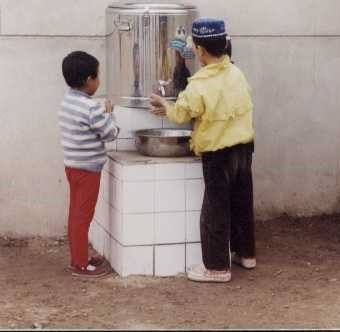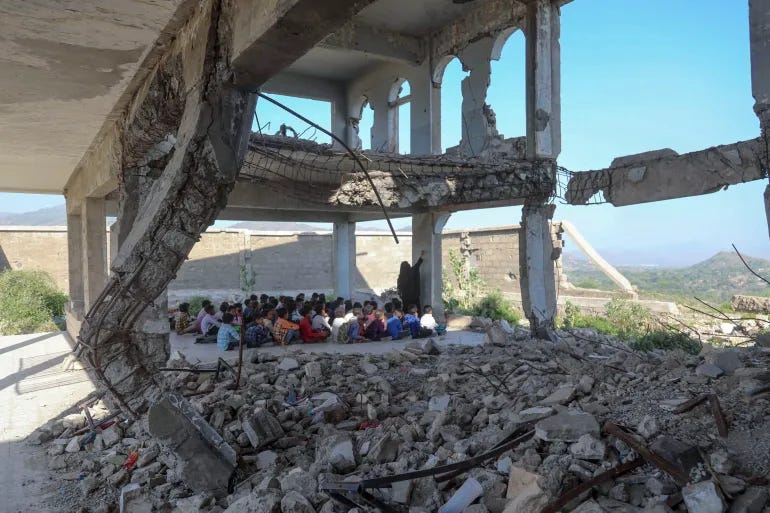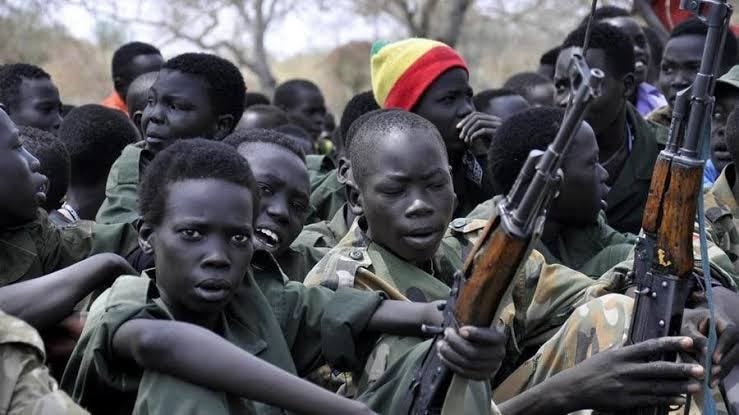Re Education : Issue #6 - Reform in a Storm
A newsletter about international education development
Fragile Spring
Introduction
What’s it like to try to implement an education reform project in a quasi-conflict zone ? My guest interview this month comes from an anonymous project leader (see end of newsletter).
It’s an inspiring story where fragile successes show themselves like the first buds in April ; successes that yearn for spring but fear an early frost.
It’s a frustrating story too. One of petty rivalries : between donors and between implementers, between those focused on humanitarian needs and those focused on development needs. A story of reliance on a few key actors, where the “curse of competence” means potentially losing the most effective change agents. A story of good people trying to do good things, but sometimes being undercut by human flaws and organisational politics.
All these challenges face education reform in non-conflict zones, but here they are supercharged by fear and unpredictable violence. Is this the right context to undertake education reform, or is it too risky and precarious to even try ? To answer that, ask the children. Even these small and shaky steps help those children now going through school, help hope return to their lives. And if peace prevails, they set the foundations for a better future.
So, despite the imperfections, kudos to the educators and officials, the donors and NGOs, the implementers and supporters : those who run towards danger. Building an education system needs many hands : but, they work best who work together.
Andy Brock, April 2024
Subscribe for free and receive each issue of Re Education automatically to your inbox.
If you want to fix a problem, you have to understand who is benefitting from not fixing it, not who is suffering from it. Anon
News
Some snippets of recent news / events that seem worth sharing.
Over 800 schools have been bombed or destroyed in Gaza and 17 institutions of higher education. David Skinner of Save The Children talks about the impact on a generation of children in this piece.
Kidnappings of schoolchildren in Nigeria are on the rise. A few weeks ago 286 children were kidnapped in Chikun in Kaduna State – later 137 were released. Why have children become the targets ? This article by Oluwole Ojewale analyses and suggest three main reasons – failure of governance, large forest areas nearby and children’s vulnerability. An interesting comment on governance in his article is that the failed 2021 safe schools initiative in Nigeria was led by the Ministry of Finance !
Development
A plethora of articles about the merger of DFID and the Foreign Office into FCDO – the main loser being DFID. This has been occasioned by a National Audit Office (NAO) report which in typically understated mandarin-speak says something along the lines of “mistakes have been made and there have been downsides”. This article in the Guardian summarises the key findings and, in more direct language, the analysis and criticisms of external parties.
Those puzzling on the rationale for this merger will be interested in this extraordinary exchange (surfaced during the COVID enquiry) between two of the UK’s top civil servants. Nothing like evidence based decision-making when you reform one of the most successful parts of British government ….There have been calls this week to abolish the FCDO completely and replace it with a Ministry of Foreign Affairs….
Figures for UK aid spend in 2023 have just been released. A concise summary here from Ian Mitchell. Headlines - more than half the UK aid budget is being spent in the UK on refugees, admin and research ; reorientation of remainder of budget to Africa.
USAID is leading an very worthwhile initiative to reduce lead poisoning worldwide, including a recent announcement that they are working with the Standards Organisation of Nigeria to mitigate lead poisoning.
“Globally, an estimated one-third of children have blood lead concentrations that impair cognitive development and contribute to learning disabilities and attention deficits”
Although this is an old thread, if you’re interested in how policies really get made, and what really influences politicians and decision-makers, then this Twitter/X (TwiX ?) thread has some real gems, especially aimed at academics, but relevant to anyone trying to make change happen.
Voices from the front
The Annual State of Education Report (ASER) in Pakistan was released in March. It makes for both grim reading and optimism. The optimism is that there is continued commitment to collecting the data and holding it up to scrutiny. A helpful report card illustrates visually what is plain for all – there is backsliding and stagnation across most metrics. Worst of all, is the failure at Grade 3. Baela Jamil, Chief Executive Officer at Idara-e-Taleem-o-Aagahi, and one of the driving forces behind ASER, put out a blistering analysis and heartfelt cry for change. She said :
Learning up to grade 3 is considered low stakes and that is where the tragedy strikes when the system is misaligned with nature's programming; when the child's neural pathways are wiring furiously through nature's design, learning stimulation is the weakest; primary schools are weakest in provision.
The Malala Foundation has written to PM Shehbaz Sharif urging the government to spend 4% of GDP on education. The current figure is less than 2%, too low to achieve change.
Voices from the rear
(Gray and Published Research)
The irrepressible Dave Evans provided an update on a review of reviews that he and Anna Popova did 8 years ago : “What works to improve education in low and middle income countries”. They supplement this with 4 later papers and reference to the GEEAP “Cost-effective Approaches to Improve Global Learning” paper. It’s a useful short cut to the prevailing literature.
Perhaps even more interesting is an exchange with Cornelius Chipoma, at the end of the link above, where Chipoma astutely points out that none of this really addresses education systems as a whole and how to change them for the better ; it’s a well put argument.
Education Sub-Saharan Africa (ESSA) have released a report on the State of Education Research in Africa. The report highlights that a surprising 90% of education research in Africa is “self-funded”, though, rather unhelpfully, it doesn’t define that term, but the 10% is provided by donors. The report lays out the steps to improving the quality and breadth of education research, including having better gender representation, but none of this will happen without better and more reliable financing.
History Lessons
In 2002 The Economist ran an article headed “How to Save 1m Children a Year”. It focused on the benefits of handwashing to prevent diarrhoea and other diseases, citing research that showed that handwashing with soap could cut diarrhoeal diseases by almost 50%. I was, at the time, leading a project in rural China which included bringing piped water to remote rural schools and could see the immediate benefits first hand.
Twenty-two years on and this basic health message is still needed. A great short video by Soap Aid shows how discarded hotel soap is saved from landfill, cleaned up, and put to good use in developing countries….and in Australia.


In Oxford, Somerville College, on 4th April there was a conference remembering Lalage Bown, who died in 2021, an indomitable promotor of adult education and a great friend of Africa, who taught at several African universities including Ibadan in Nigeria and Gold Coast in Ghana. She produced one of the first books on African literature in English : “Two Centuries of African English” in 1973. One of her many quotes was : “They say you can’t teach an old dog new tricks, but research has shown that you can go on learning new things until you drop off the perch”.
Guest Post
The Context :
The Recovery Project (an alias) works in an area of recent and current conflict under the control of an alternative authority to the government. Several sometimes-rival armed groups also operate in this area ; there is an uneasy relationship.
The project is funded by an international donor and several other donors operate in the same space. I spoke to one of the leaders of the project.
Q: What do you feel are the greatest successes of the Recovery Project so far ? What are the challenges to implement an education project in a quasi-war zone ?
A: Our overall aim is to improve learning outcomes for children. But, I believe the biggest success is that the Recovery Project is the first programme to focus on delivering formal education in this area. All other actors – largely NGO’s - have been focusing on non-formal education.
When we applied to run the Recovery Project we focused on improving the quality of education by relying on the actors on the ground who were already there and managing the education system. That meant there was a better chance of longer-term sustainability.
Q: Why were NGOs not focusing on working with government ?
A : The main reason is because they are humanitarian organisations – they see education through a humanitarian lens. Also, most of the funds at that time were coming via UN agencies. Those agencies had sensitivities around their relationships with the government – they had offices in the government capital, so if they were seen to be supporting the government’s opponents that could cause difficulties.
Another reason is that the funds for education for those NGOs is usually much smaller than for other sectors like health or food security, so, they can’t support the whole system.
Even in the Recovery Project we can’t support the whole education system, but we look at the needs from a government perspective and by working with the ministry we are able to empower them. The result, after a couple of years of work now, is that there is a changed mentality and ownership around formal education. We have also started to see more NGOS putting greater emphasis and funding into formal education.
Q : How does capacity building in these circumstances start ? A traditional model would use outsiders to kick start the process – were you able to do that ?
A : We recruited about eight coaches to work with the ministry – our champions. Most came from another conflict area – so they had institutional knowledge which the ministry respected. The challenge was that, as former government staff, though they had long years of experience, they also tended to have a resistance to doing things differently. In another region I know they had to start from scratch, everyone with knowledge was gone, so it was much harder.
We tried to pick those who were quick learners and open minded – we needed to rely on them. There were positives and negatives to this approach. The positives I’ve mentioned, the negatives were what I would call the “curse of competence”. Those people, if they were good, would easily be attracted by other sectors offering better pay. And, there were always tensions : they were ex-government staff advising “alternative government” staff. Nonetheless, we were able to find good people who showed their value.
We also supported inspectors with training and stipends. These were ministry staff whose role was to provide support to clusters of 10-15 schools. We needed data and they were well placed to collect data as well as support schools and teachers. This was an embedded capacity building approach.
Q – What is the role of the alternative government : how much influence do they have ?
A : They are very ineffective. They have little authority and no resources. So, although as a citizen of this country I shouldn’t say this, part of me is happy that donors are influential in education policy. For example, recently we learned that an updated curriculum is being piloted in some schools. We did not hear this from the ministry but from other sources. This is a red line – the funding will stop. You need to get agreement from all, and donors need to be consulted.
But, equally donors keep blaming the alternative government for the problems in the system even though they have no real control. But, you can’t just ignore them - the government pays those who no-one else is paying – and they sometimes have to step in and pay when teachers’ salaries don’t come. This freaks the donors out because they are sensitive to teachers potentially being paid twice.
Q : What are the main priorities in these circumstances for children and teachers ?
A : Well we’re not in a constant conflict situation but there is still conflict and multiple crises. There is still fighting and bombing. So, the most important thing is making sure teachers are paid. It’s very simple, very basic, but very necessary : we need to keep teachers and students in schools.
In terms of priorities : first, we did not have the best education system before the war and now things are getting worse. That’s why we are looking at systems strengthening. Really, it’s system reform because so many parts of the system are broken.
The ministry is the only entity capable of standardising delivery and supporting minimum standards. For example, in safeguarding, NGOs have implemented their own measures. We didn’t do that – we worked with the ministry to create a ministry safeguarding policy, to make sure that all children in the system are safeguarded.
We help the ministry come up with their own strategies. For example, changing the nature of inspection. Previously, inspection was a compliance system (counting children, desks, books) now it’s a support system helping to coach teachers and providing continuous support. Inspectors have created learning circles and all teachers have 1:1 sessions.
Q : Does your donor understand / support long term support ?
A : Yes, because they accepted the way we structured our approach and the way we work with government on leadership and influencing for example. If you want to influence you need to touch many points. For example, donors have access to other donors. You need to change behaviour at the local level. Eventually, this is where all influence happens : locally.
Coordination is one of the biggest problems any sector faces. The education cluster is very ineffective. The Recovery Project has been the biggest education programme in this area for years, but we only joined the cluster quite recently. This is too common a scenario – rivalry between donors and between implementers. It’s short-sighted and only leads to poorer outcomes for children.
Q : What are the challenges in providing support to children who have been through trauma / violent conflict ?
A : Our approach is child focused / driven and is trauma-informed. It was a challenge when we started. First there’s culture - until recently corporal punishment was prevalent. But, to keep children in schools they need to be in a safe environment. So, we had safeguarding measures, a code of conduct and a legal framework to make teachers committed. As we were paying salaries it was easier to implement along with training. There’s also awareness raising and community engagement. We’ve seen progress in resilience, but everything falls apart when the bombing starts again.
The sad things is, for many children, especially in the early grades, they know no other kind of life.
Q : How much community involvement is there ?
A: Schools do engage parents – they come to workshops and we engage them in awareness raising sessions. We also helped establish special support committees in schools that include parents, caregivers, children and school staff. This focuses on enhancing safety of schools. Because there’s a lack of clear government structures community can be one way of holding schools accountable. So, we’re also gradually introducing discussions about learning results with these committees. This was completely new – before the war there was zero community engagement in schools.
Q : In this situation – why focus on learning outcomes ? Isn’t safety the most important thing in schools ?
A : It’s a difficult question. The ministry only cares about schools being open and that there’s an education process happening. But, someone needs to focus on leaning outcomes. It gives you an idea about how teachers are performing and that’s what drives the system.
Q : Is this focus on learning outcomes an incentive for teachers ?
A : That’s a research question ! You would need to ask teachers. My immediate response is “no” because my assumption is that teachers’ first focus is on salary – and that’s why we strongly support financial support to teachers to keep schools open. But, we also had teachers who worked for a year without pay - that’s not explained by a purely self-interested focus on salaries. Teachers have a vocation, but they can’t be asked to do that for free.
If you know someone who would be interested in reading this newsletter, please pass on, by clicking the share button below. Subscription is free - subscribers receive each issue of Re Education automatically.









